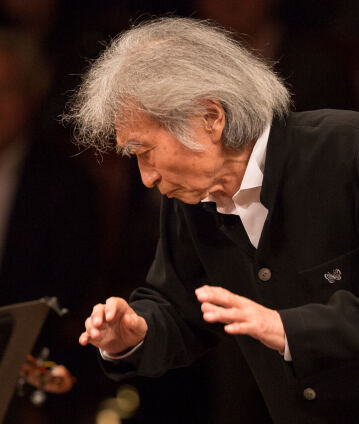Mendelssohn’s “Elijah” with Seiji Ozawa, Matthias Goerne and Annette Dasch

For many, the oratorio Elijah is the pinnacle of Mendelssohn’s oeuvre. Not only because of the rousing choruses and stunningly beautiful arias, but above all the dramatic power of the work, which is occasionally referred to as “Mendelssohn’s unwritten opera”. Here, Seiji Ozawa conducts a superb ensemble with Matthias Goerne in the title role, along with Annette Dasch, Anthony Dean and Nathalie Stutzmann.
Almost no other Romantic composer contributed as much to the rediscovery of Bach’s and Handel’s music as Felix Mendelssohn. He also drew on the Baroque masters in his own works, which is particularly obvious in his great oratorios St Paul and Elijah. The latter, which was presented for the first time in English in Birmingham in 1846, conducted by the composer, unexpectedly became a legacy of sorts, since Mendelssohn died shortly afterwards and did not live to witness the first German performances of the work.
It is also in a spiritual sense a last word of the composer; the Old Testament subject matter allowed him to affirm both his Jewish roots and his adopted Christianity, since the arrangement of the text makes it clear that the prophecies of the coming Messiah refer to Jesus. The oratorio is one of Mendelssohn’s most fascinating works; a wealth of melodic inspirations and dramatic excitement are wonderfully combined. Contrary to the prevailing Mendelssohn image of predominantly elegant and graceful music, the character of the prophet comes to the fore particularly in his rugged, unyielding and defiant traits.
To mark the 200th anniversary of the composer’s birth, the Berliner Philharmoniker presented the work under the baton of Seiji Ozawa, who has been one of the orchestra’s regular guest conductors since Herbert von Karajan’s day and was named an honorary member of the Philharmoniker in April 2016. Ozawa is particularly fond of Elijah and conducted one of its rare performances by the Berliner Philharmoniker in 1984. At this concert, the ensemble of distinguished soloists was led by Matthias Goerne in the title role, who as a lieder singer is one of the most outstanding interpreters of German music of the Romantic period.
© 2009 Berlin Phil Media GmbH
Related interviews
Artists
Our recommendations
- Seiji Ozawa conducts Bruckner’s First Symphony
- Seiji Ozawa returns to the Berliner Philharmoniker
- The Berliner Philharmoniker and Seiji Ozawa at Suntory Hall in 1986
- Seiji Ozawa conducts a “Russian Night” at the Waldbühne
- Seiji Ozawa conducts Orff’s “Carmina Burana” at the 1989 New Year’s Eve Concert
- Seiji Ozawa conducts a Gershwin Night at the Waldbühne